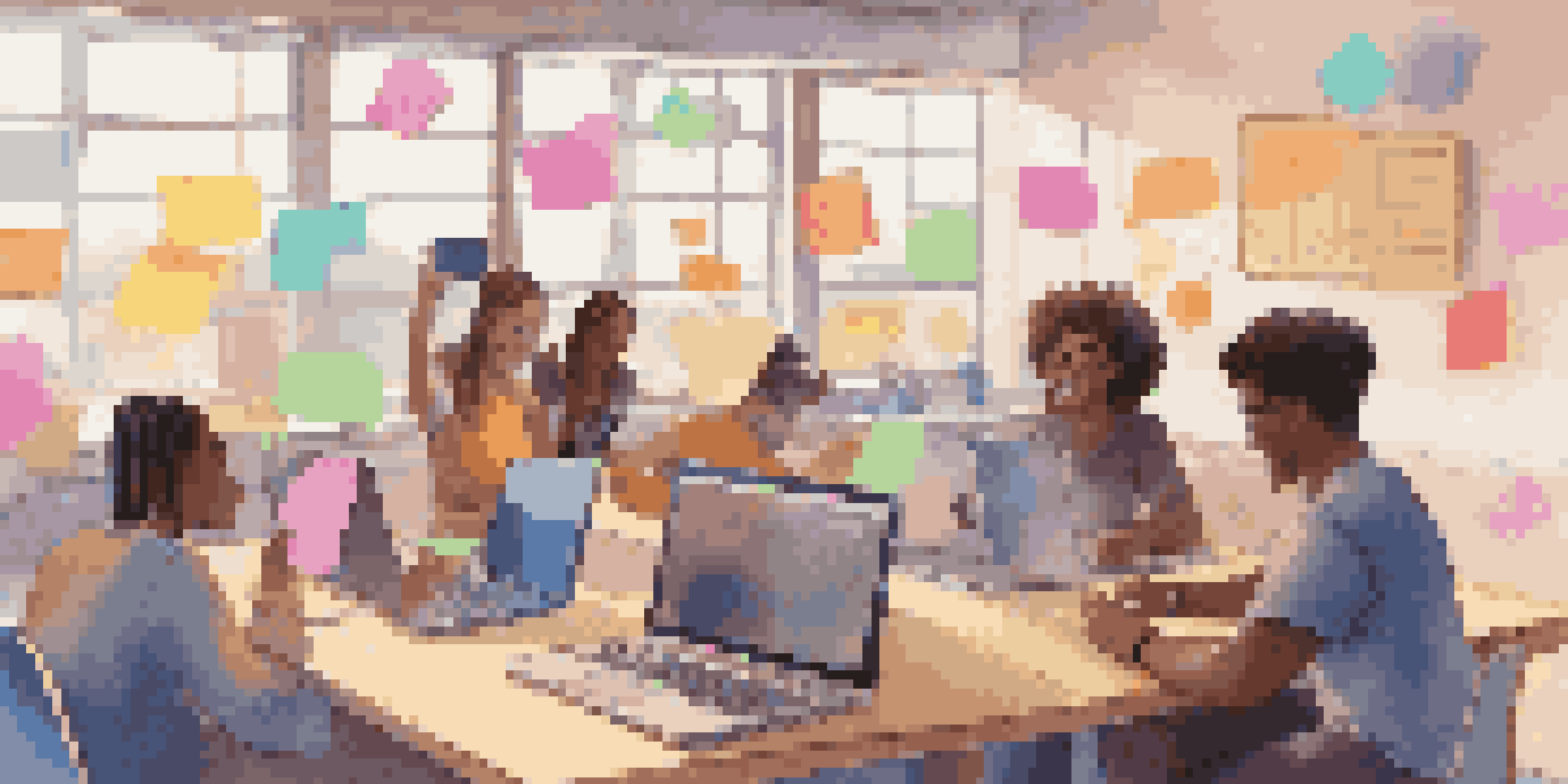Strategies for Teaching Soft Skills in Remote Education

Understanding the Importance of Soft Skills in Remote Learning
In today’s digital world, soft skills like communication and teamwork are essential, especially in remote education. These skills help students collaborate effectively, understand different perspectives, and navigate challenges. As we adapt to online learning environments, prioritizing soft skills becomes crucial for student success, both academically and professionally.
Soft skills get little respect, but they'll make or break your career.
Remote education presents unique challenges, including limited face-to-face interaction, which can hinder the development of these skills. It's vital for educators to recognize this gap and implement strategies that foster soft skills within their online curriculum. By doing so, we prepare students not just for exams but for real-world scenarios where collaboration and emotional intelligence are key.
Ultimately, enhancing soft skills in remote settings can create well-rounded individuals who are better equipped to handle future workplace demands. This holistic approach to education nurtures not only academic growth but also personal and professional development, making it a win-win for students.
Utilizing Interactive Tools for Engagement
Interactive tools like virtual breakout rooms, polls, and discussion boards can significantly enhance student engagement in remote education. These platforms allow students to participate actively, share ideas, and collaborate in real time, mimicking traditional classroom dynamics. For instance, using breakout rooms during a group project encourages teamwork and communication among peers.

Additionally, incorporating gamification elements can make learning fun and competitive, motivating students to develop their soft skills. For example, using platforms that reward points for participation can foster a sense of achievement and encourage students to engage more fully. This not only boosts confidence but also promotes a collaborative spirit.
Soft Skills Essential for Success
Soft skills like communication and teamwork are vital for students' academic and professional success in remote learning.
By leveraging these interactive tools, educators can create a more dynamic learning environment that prioritizes soft skill development. This approach helps students feel more connected, reducing feelings of isolation that can often accompany remote learning.
Encouraging Group Projects and Collaborations
Group projects are a fantastic way to cultivate soft skills in a remote setting. They require students to communicate, delegate tasks, and resolve conflicts, all of which are vital for their future careers. Assigning team-based assignments can simulate real-world scenarios where collaboration is key, helping students learn how to work with diverse perspectives.
The greatest skill is the ability to communicate effectively and relate well to people.
Moreover, group projects can foster accountability among students, as they learn to rely on one another to achieve a common goal. This shared responsibility encourages them to develop skills like leadership and negotiation, which are essential in any professional environment. As they navigate challenges together, students also build resilience and adaptability.
Educators should provide clear guidelines and support for these group projects to ensure that all members contribute equally. By facilitating these collaborations, teachers not only help students acquire soft skills but also create a sense of community within the remote learning space.
Incorporating Real-World Scenarios and Role-Playing
Using real-world scenarios and role-playing activities can bridge the gap between theoretical knowledge and practical application of soft skills. When students engage in simulations, they experience firsthand the importance of effective communication, empathy, and problem-solving. Such activities can range from mock interviews to conflict resolution exercises, providing students with invaluable insights.
These scenarios help students reflect on their behavior and interaction styles, encouraging personal growth. For example, participating in a mock negotiation can teach students how to articulate their thoughts clearly while also considering others' viewpoints. This kind of experiential learning is often more impactful than traditional lectures.
Interactive Tools Boost Engagement
Utilizing interactive tools in remote education enhances student engagement and fosters the development of soft skills.
By integrating these activities into the curriculum, educators can create a safe space for students to practice and refine their soft skills. This hands-on approach makes learning more memorable and allows students to see the relevance of these skills in their everyday lives.
Providing Constructive Feedback and Mentorship
Feedback is crucial in helping students develop their soft skills, as it guides them toward improvement. In a remote education setting, providing constructive feedback can be done through video calls, written comments, or peer review sessions. This personalized attention fosters a growth mindset and encourages students to view challenges as opportunities for learning.
Mentorship also plays a significant role in skill development. Pairing students with mentors—whether they be educators or industry professionals—can provide them with insights and guidance tailored to their unique goals. Mentors can help students navigate interpersonal dynamics and offer advice on effective communication strategies.
Ultimately, creating a culture of feedback and mentorship not only enhances soft skills but also builds lasting relationships. These connections can be invaluable as students transition into the workforce, where networking and collaboration are often the keys to success.
Fostering a Positive Online Learning Environment
Creating a positive and inclusive online learning environment is essential for fostering soft skills. When students feel safe and valued, they are more likely to express their thoughts, ask questions, and engage in discussions. Setting ground rules for respectful communication and encouraging students to share their experiences can help build this supportive atmosphere.
Additionally, educators can celebrate individual and group achievements, no matter how small, to boost morale and motivation. Recognition fosters a sense of belonging and encourages students to support one another. This camaraderie enhances teamwork skills and nurtures a culture of collaboration.
Group Projects Enhance Collaboration
Group projects help students develop essential soft skills by promoting communication, accountability, and teamwork.
By prioritizing a positive learning environment, educators can enhance student engagement and participation. This approach not only aids in skill development but also contributes to the overall well-being of students in a remote learning context.
Integrating Technology to Enhance Learning Experiences
Technology plays a pivotal role in remote education, and integrating various platforms can enhance the learning experience. Tools like video conferencing, collaborative documents, and online discussion forums can facilitate communication and teamwork, which are fundamental to soft skill development. For instance, using shared documents during group projects encourages cooperation and accountability among students.
Moreover, technology can provide opportunities for students to engage with diverse perspectives. Virtual guest speakers, webinars, and online communities expose students to various viewpoints and experiences, enriching their understanding of different cultures and working styles. This exposure is critical in developing empathy and adaptability.

By thoughtfully integrating technology, educators can create a more engaging and interactive learning experience. This not only fosters soft skills but also prepares students for a tech-driven workplace where digital communication and collaboration are the norm.
Measuring and Assessing Soft Skills Development
Measuring the development of soft skills can be challenging, yet it is essential for understanding student progress. Educators can use self-assessments, peer evaluations, and reflection journals to gauge students' perceptions of their skills and growth. These tools encourage students to take ownership of their learning and reflect on areas for improvement.
Additionally, incorporating rubrics that outline specific soft skills can provide clarity on expectations. For example, when assessing group projects, educators can evaluate communication, collaboration, and problem-solving as distinct criteria. This not only helps students understand what is required but also emphasizes the importance of these skills.
By implementing effective assessment strategies, educators can track progress and adjust their teaching methods accordingly. This continuous feedback loop ensures that soft skills development is prioritized and that students are prepared for future challenges.